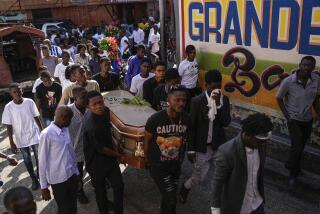Haitians’ Glee Overflows at Resignation : Reaction: Taunts and epithets greet Cedras’ speech. But onlookers insist they now want peace, not violence.
PORT-AU-PRINCE, Haiti — All of the inhibitions created by three years of frightening military rule evaporated instantly in the searing sun Monday as thousands of Haitians watching the resignation of Lt. Gen. Raoul Cedras took delight in taunting the hated army, its commander and its network of killers.
And when Cedras delivered his farewell speech at military headquarters, the crowd simply drowned him out.
“Thieves!” “Murderers!” “Put handcuffs on Cedras! Tie him up!” they shouted as American military police struggled to prevent the demonstrators from rushing the building.
“He is evil, and he has to go,” cried Paul Emile Laurent, 68.
The emotionally charged crowd hurled epithets, sang curses and roared in disapproval when Cedras appeared under the watchful escort of U.S. commander Lt. Gen. Hugh Shelton.
No one could hear Cedras speak--no one wanted to.
A clearly demoralized Haitian military looked on, several officers seated at some distance on each side of the podium where Cedras spoke.
“ Zenglendo !” the crowd jeered, using a Creole term for the most dreaded hoodlum in existence.
And when Cedras departed the scene of humiliation, Haitians hurled stones at his jeep. His bodyguards opened fire from the vehicle, sending two bursts of automatic gunfire into the humid air. Hundreds of Haitians and a few reporters dived for cover. No one was hurt.
“How dare Cedras speak to the people after all he has done to us?” said mechanic Edy Thellenge, 26, who like many began gathering early on the grassy Champs de Mars mall, between the military headquarters and the Presidential Palace, to witness the resignation.
Finally, something that had been promised for so long was actually happening, and it seemed to unleash a euphoria so long pent-up that some fear it could turn violent. But in this crowd, at least, people said they want peace, not violence. They want security and jobs in an impoverished country where prices and unemployment soared during three years of dictatorship and an international embargo.
“Now Titid will return,” said Jean Claude Israel, 39, using Aristide’s nickname.
“We voted for Aristide, not Cedras. Cedras is not doing anything for us. He is only killing our people. . . . We still have no money and we are not eating, but we can be here today. Before we would not be here. Before we would not speak.”
One boy climbed a nearby palm tree, hoisting a flag of red stripes and blue stars with an election-poster picture of Aristide stuck to it. A group of demonstrators ran around the military headquarters carrying a huge American flag and holding aloft a live rooster, the symbol of Aristide’s party.
Others performed pantomime. In one skit, a man dressed in an army jacket was given a suitcase and shown the door.
Cedras’ powerful wife, Yannick, watched the crowd impassively from the second-floor balcony of the building.
“They killed many people, but now that Aristide will come back, the military won’t be allowed to show off anymore,” said Jean Joseph Mital, a 46-year-old barber.
Not everyone shared that optimism. Mimose Isidor came to the Cedras ceremony to see the man she blames for the murder of her husband, a driver who worked for Aristide’s Cabinet and was shot to death soon after the coup that ousted Aristide.
“People are still afraid because nothing is clear yet,” she said.
Magalie George, 35, a high school teacher, was also skeptical about the future.
“If there is justice, there may be no more violence,” she said. “If there is no justice, then they will use tires. That is their weapon.”
She was referring to a practice in which burning tires are put around enemies’ necks, a killing technique known to have been utilized by Aristide supporters in the past.
The U.S. military, which escorted Cedras to and from Monday’s ceremony, was on duty protecting the hated commander. Five Humvees were parked at the end of a road leading to his elegant hilltop house to prevent crowds from reaching it.
One sign of how fast the authority of the Haitian military is collapsing came about an hour before the ceremony. Huge crowds of demonstrators and journalists had descended to within a few feet of the military headquarters’ front door, and the Haitian army repeatedly ordered them back. The crowd ignored the orders.
A Haitian officer, G. R. Gabriel, took to the megaphone, imploring people to move.
“We would not want people to think we aren’t civilized, so please move back,” he said. The crowd hooted at that.
Then a group of about 10 U.S. military police arrived and ordered the people to move back, and the people complied immediately.
More to Read
Sign up for Essential California
The most important California stories and recommendations in your inbox every morning.
You may occasionally receive promotional content from the Los Angeles Times.











